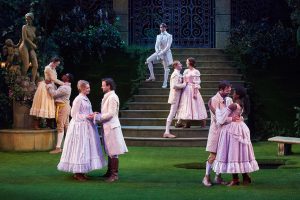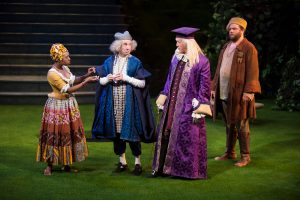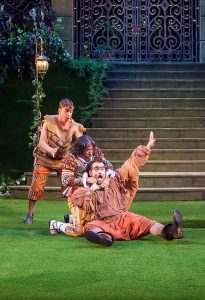Old Globe’s Labors Win With ‘Love’s Labour’s Lost’
Back in the east wing of the Timken Museum in Balboa Park, amongst the stern portraits and formal tableaus of high European art, hang a couple of paintings, by Boucher and Fragonard, that serve as windows into the fantasy Arcadia of the French Rococo: aristocrats, milkmaids, rustics and sprawling foliage, taking their casual ease decades before the French Revolution, lounging in a porcelain version of the verdant displays in the nearby Botanical Building.
A late-afternoon summer stroll through both park institutions might be an inspired way to prepare for maximum enjoyment of the Old Globe Theatre’s elegant production of Love’s Labour’s Lost, now on delicious outdoor display through Sept. 18.

In Old Globe’s Love’s Labour’s Lost, left to right, are Talley Beth Gale, Amara James Aja, Kristen Connolly, Jonny Orsini,Kevin Cahoon, Nathan Whitmer, Amy Blackman, Kieran Campion and Pascale Armand. Jim Cox Photos
The master gardener here is John Lee Beatty, whose scenery establishes a verdant cascade of carefully groomed nature, featuring a life-sized nude of Aphrodite, peering over her right shoulder at a cupid preparing to pinch her butt. There have always been luxurious variations of formal horticulture on Shakespearean stages, at the Globe and elsewhere, but I can’t remember one more lush and appealing. Jason Lyons fondles the scenery with variations of hue and angle in a lighting design that deserves, and receives, its own languid pacing.
Love’s Labour’s Lost is an early comedy using characters and a wisp of plot from the Italian commedia dell’ arte to romp through the flowering of mannered language – style for style’s sake – that obviously intoxicated the young playwright. Every known variation of Elizabethan literary pedantry (some remembered mainly because of their presence in this play) is given its turn, polished by the author’s wit and finished with a coat of satire. The play really has no other reason to resist besides this sublime linguistic horseplay.
How clever then of the Globe to employ as stage director Kathleen Marshall, an admired veteran of the Broadway musical comedy stage. Her genial, relaxed approach to the play is exactly the thing for material which must be balanced carefully on the edge between burlesque and dry scholarship.
She takes players who are assigned attitudes more than characters and, having made sure they lift their assigned load, she touches each with subtle individual details. Thus, when a hopelessly slow-witted country constable named Dull introduces himself, it’s with a resounding: “I am Dull!” We get it.

Makha Mthembu, Patrick Kerr, Stephen Spinella and Jake Millgard, left to right, in Old Globe Theatre’s Love’s Labor’s Lost.
The best example of this is the splendid Stephen Spinella, unforgettable as the AIDS victim of Angels in America, here playing the most self-important pedant, Holofernes, who never heard a figure of speech that he couldn’t make even more stilted. Yet Spinella, employing an arresting vocal resonance that separates him from any crowd, really is interested in anything anybody else has to say and expresses a charming appreciation when somebody else scores.
The same, in context, is true of Triney Sandoval as the fantastical Don Adriano de Armado, a combination of Falstaff and Don Quixote, among others, who roams the land spreading bombast. As Jacques will “suck melancholy out of a song as a weasel sucks eggs” in a later and greater comedy, Don Adriano gobbles up every morsel of insight and re-launches it as a cadence at once lofty and silly. As a supplier, he employs the bright child Moth, here played pertly by Daniel Petzold as a growing boy who may someday have to invent basketball.
Patrick Kerr as a camp-follower curate, Makha Mthembu as a lusty wench of refreshing vitality and Greg Hildreth as the shameless rural vulgarian Costard are the other clowns, all tingling with the juicy joy of escaping the commedia and helping Shakespeare grope toward immortality.
Of the aristocrats, there is less to say. They are two quartets: (1) The King of Navarre and three close pals who agree to take three years off for severe study and contemplation, eating just one meal daily; fasting one day weekly; sleeping just three hours nightly; and seeing no women, and (2) the Princess of France, on a diplomatic mission and accompanied by three comely attendants. They enter about one paragraph into the monastic retreat and, well, Nature, so snubbed by the dreary academic scheme, takes Her course. The rest of th play involves labored schemes to help pair off these kids and move on toward the civil order Shakespeare always yearns after.
The King, played with easy authority by Jonny Orsini, is no fool, just overly susceptible to fads. Fortunately, he has Berowne, by far the sharpest pencil in the set, to help him rationalize a path out of the academician pledge with honor intact and the field clear for a royal wooing. This Berowne, obviously an ancestor of Benedict, is played with wry manly grace by Kieran Campion and his partner (Pascal Armand as Rosaline, a blossoming Beatrice from the Princess’s entourage) is his match, even though there’s little chemistry between them.
Kristen Connolly, as the Princess, is served if not better, then more deftly by her courtier Boyet, a simpering sissy back in the day but played now with zest and pride by Kevin Cahoon, as a harlequin of a very different focus.
This minuet is danced with sonnets, symmetrical eavesdropping, mis-delivered messages, tokens, disguises and abundant cavorting. Are there Russians visiting? Out come the Boyer and Cossack costumes and, disdaining a choreographer, Marshall and the boys crank up The Nutcracker excerpts and fake away. (Peter Golub contributed bits of original music for Sten Severson’s jolly soundtrack. And Michael Krass’s costumes are sleek and clever, with just enough to off-beat details to maintain a comfortable distance from reality.)
There is a masque of the classical worthies presented by the clowns and things are nearing hysteria level when the deus ex machina appears: A messenger bringing the Princess word that her father has died and she must return quickly to be crowned Queen of France.
All but Navarre drop to a knee, in one of the most touching moments of any LLL production. The revels are ended, enter cold reality. And, unlike the majority of Shakespeare’s comedies, there is no pairing off for living happily ever after. Instead, a challenge by the new Queen: Spend not three years in retreat but just one, then come to France and see what happens.
Will they hook up eventually? Impossible to know but really, who cares? They are just painted figures fading with time.
And this most artificial of plays ends, as Mark van Doren has pointed out, with one of Shakespeare’s most natural songs:
When all aloud the wind doth blow,
And coughing drowns the parson’s saw.
And birds sit brooding in the snow,
And Marian’s nose looks red and raw;
When roasted crabs hiss in the bowl,
Then nightly sings the staring owl:
‘To-who! Tu-wit, tu-who!’ a merry note,
While greasy Joan doth keel the pot.
(Continues at 8 nightly except Mondays, with Tuesdays, Wednesdays and Sundays changing to 7 nightly on Sept. 11, on the Lowell Davies Festival Theatre outdoor stage through Sept. 18, 2016.)

Welton Jones has been following entertainment and the arts around for years, writing about them. Thirty-five of those years were spent at the UNION-TRIBUNE, the last decade was with SANDIEGO.COM.



